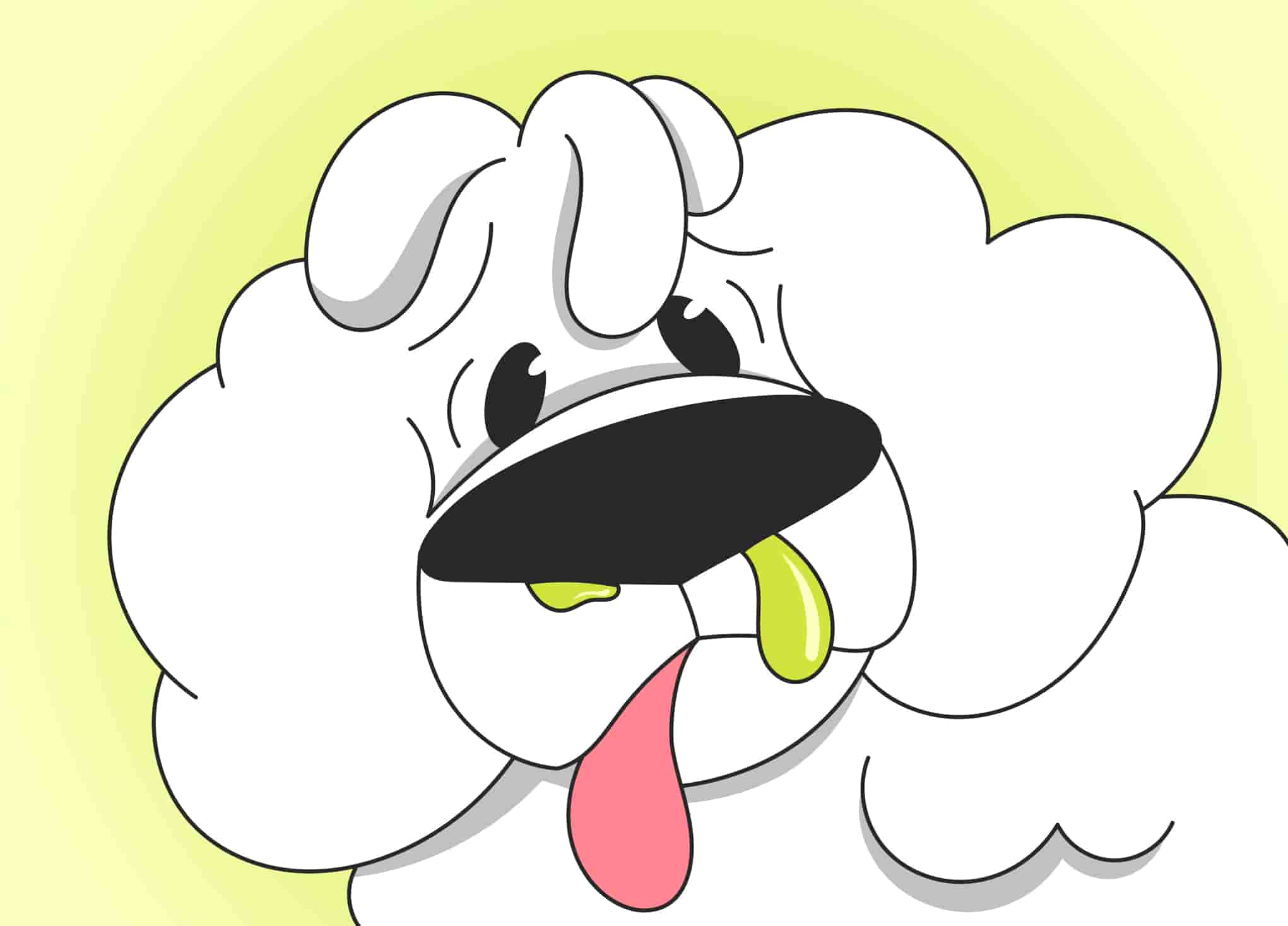It's commonly accepted that a dog with a wet nose is a healthy little doggo. But if your dog's nose is running more and more frequently, it might be something to take note of.
While an occasional clear nasal discharge isn't a reason to panic, a persistent and very runny nose could indicate a more severe issue. If the discharge is thick or changes in color, you should consult a vet.
For humans, a stuffy and runny nose can be mildly annoying and a little inconvenient, but it can be a huge deal for a dog. A dog's nose is a finely tuned instrument that they use to navigate the world. With 220 million smell receptors (humans only have 5 million), a dog's nose is their most important sense.
Read on to find out all about runny noses in dogs – what causes them, how they're diagnosed, and how to treat them.
Stop Googling - Ask a Real Vet
Causes of a runny nose in dogs
Like in humans, many things can cause your canine to develop a runny nose.
Allergies are the most common cause of runny noses in dogs. This should come as no surprise when you consider smell's critical role in a dog's life. Those curious little snouts can sniff up a range of particles, some of which may cause an allergy.
Clear, watery discharge, sneezing, coughing, eye goop, and breathing problems are indicators that your dog is allergic to something in their environment.
Petcube interactive dog camera can help you document your pet's behavior and health issues, such as allergens at home.
If your dog has discharge from only one nostril, there's likely a blockage or a foreign object stuck in that nostril. Maybe they've inhaled a small seed or grain which is now stuck and is irritating. The presence of a foreign body in your dog's snoot may be accompanied by sneezing, nosebleeds, and pawing at the nose.
According to research, nasal discharge that is thicker or contains pus is a sign that your dog may have an infection. Other symptoms of an infection include foul odor, nosebleeds, and coughing. The treatment for an infection will depend on whether the condition is viral, bacterial, or fungal.
The physical structure of a dog's snout means that any issues with their teeth can easily cause an infection or irritation in the nose, resulting in nasal discharge. An abscess in a tooth and even gum disease can irritate the nose, leading to your dog developing a runny nose.
Other potential causes of runny noses in dogs include nasal polyps (basically overgrown mucus-producing glands) and tumors.
Diagnosing the issue
A runny nose that is recurrent, persistent, or involves a change from clear watery discharge to mucous, pus, or even blood should be seen to by a vet as soon as possible.
Your vet will likely examine your dog's teeth to rule out any dental issues causing your dog's runny nose. A sample of the nasal discharge may be taken and sent for examination to look for fungal or bacterial presence.
Your vet may require further lab work and X-rays for particularly elusive causes of your dog's runny nose. A rhinoscopy – a small camera inserted into your dog's nose to see inside – may also be needed to determine whether something inside the nose that could be causing the problem. This is usually done under anesthetic.
How to treat a runny nose in dogs
How you treat your dog's runny nose will depend on what is causing the nasal discharge to begin with.
In the case of allergies, if you know what the irritant is, you can take steps to avoid your dog encountering it. Some allergens, however, are not as easy to avoid, like pollen or mites. In this case, your vet may prescribe an antihistamine, steroids, and other allergy medications to relieve the symptoms.
An infection that is caused by bacteria can easily be treated with antibiotics. If a fungal infection is present, your vet may give it time to clear on its own and, failing this, will prescribe a course of antifungal treatment.
For viral infections, there’s no treatment, but your vet may prescribe medicine to alleviate your dog’s symptoms.
Surgery may be required to remove foreign objects deep in the nose and remove nasal polyps (overgrown mucus-producing glands) and benign tumors. Cancerous tumors may also need a course of radiation to manage, but usually, the prognosis for cancerous nasal tumors isn't good.
Online Vet & Emergency Fund
As a pet parent, it can sometimes feel like you're left to sniff out answers for yourself or pay for a vet visit that maybe you didn't need to begin with. Petcube's Online Vet is here to provide the guidance and advice you always wish you had.
For just $20 a month, you have access to a team of trained veterinarians who can provide advice, guidance, and answers to your questions anytime, day or night. Send a text message, add a photo or video, and get a response in real-time.
Not sure if your pup needs to go to the emergency vet? Or can it wait till morning? Is there something you can do in the meantime? Online Vet is there to answer your questions, and maybe save you from an unnecessary vet’s bill.
And for those times when an emergency visit is simply unavoidable? Make sure you've added an Emergency Fund for just $9 extra a month. This offers you up to $3000 of emergency treatment annually. With an emergency fund, you can rest assured that you'll be able to provide for your pet's care in an emergency.
Read more: What To Expect From An Online Vet Visit
FAQ
My dog has a runny nose and sneezing – what does this mean?
A clear, watery discharge is a sign of irritation inside the nose, most commonly due to an allergy or a foreign object. If these are the only two symptoms, it will likely pass and isn't cause for too much concern.
If other symptoms are present or the nasal discharge becomes thicker or changes color, it's a good idea to contact your vet.
What causes a runny nose and a green discharge in dogs?
A thick nasal discharge that is green or yellow is a clear indication that an infection is present. The infection could be caused by a virus, bacteria, or fungus.
Bacterial infections can be treated with antibiotics, and fungal infections usually respond to antifungal medications. In the case of viral infections, these will need to run their course.
If your dog has a yellow discharge or green discharge from their nose accompanied by sneezing, a loss of appetite, and/or diarrhea, contact your vet as soon as possible.
What can I give my dog for a runny nose?
The treatment for a runny nose in dogs will depend on the cause of the problem, so there's no one answer to this question. While it's tempting to want to give your dog some of your own cold and flu medication to help, this isn't a good idea.
We would never recommend giving your dog any medication (especially human medication) without consulting a veterinarian.
Human medications can sometimes contain ingredients that are harmful to dogs or active ingredients at an inappropriate dosage for a dog.
What about Benadryl? Can I give my dog Benadryl for a runny nose?
Benadryl is one of the few human medications that can be safely given to dogs. That said, always consult with your vet before giving your dog any medications to ensure it's the right solution for your pet and to ensure you're giving the correct and appropriate dose.
Note from Dr. Chris Vanderhoof (DMV): any antihistamine with a decongestant added in with it (the "D" form) containing pseudoephedrine is not safe for dogs.
Why does my dog's nose drip when they get excited?
It's very common for an anxious or overly excited dog to experience watery, clear nasal discharge that drips. In humans, excitement and anxiety can cause sweating, but since dogs don't sweat, they only have their paw pads and nose to work with. So, their nose begins to run!
My dog's nose is running. Is it COVID?
According to CDC, cats and dogs can get COVID from their humans, and a runny nose is one of the symptoms to look out for. The good news is that pets can't transmit COVID to humans.
Read more: Coronavirus in Pets: Can Dogs and Cats Get Infected?
While pets can get COVID, it's rare for them to get very ill. Most animals have very mild symptoms if any, but you'll need to isolate your pet and keep an eye on them to ensure they aren't getting worse.

Was this article helpful?
Help us make our articles even better









